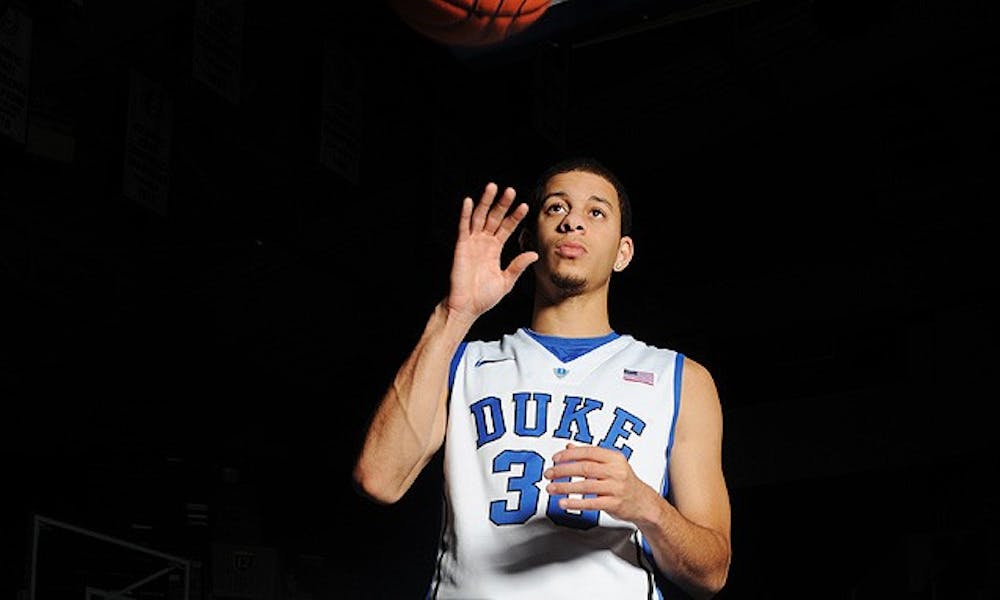Seth Curry has always been a bit of a enigma. His quiet demeanor and unheralded arrival at Duke as a transfer from Liberty University have kept him out of the spotlight so far in his career.
When news broke that he would be transferring to Duke in 2009, merely days after the Blue Devils’ disappointing Sweet Sixteen loss in the NCAA tournament, he was best known for the last name he shared with his brother, current NBA standout Stephen Curry.
The next year, he sat on the sidelines as a redshirt freshman while Duke put together an NCAA championship run.
Last year, he finally found himself on the active roster and did not disappoint. Despite sharing scoring opportunities with fellow standout guards Kyrie Irving, Nolan Smith and Andre Dawkins, Curry still managed to average nine points and 1.4 steals per game. He distinguished himself in 3-point territory, where he made 43.5 percent of his attempts, totaling 64 field goals beyond the arc, tied for most on the team. His performance in the ACC tournament—in which he scored double digits in every matchup—was especially impressive, earning him a spot on the ACC All-Tournament second team.
With two of those guards gone to the professional ranks, Curry anticipates a greater burden on the court. Traditionally, his role has been that of a pure scorer. He came into games and put together electrifying performances, heavily weighted toward long-range jumpers. This was especially true his freshman year at Liberty, where he led the nation’s freshmen in scoring as the clear first option in the Flames’ offense.
He will be asked to play a different part this year, though.
“On game day, I do expect to be starting at point guard,” he said.
His new job requires more than just the occasional hot streak—it requires a heightened level of comfort with the team that will allow him to control its offense.
“[In the offseason] I worked on my ball handling a lot,” Curry said. “It’s a different pace, handling the ball and bringing it up the court. But, the biggest thing [for me] is getting into game situations and learning to run a team. I am still working on that.”
He has shown his scoring ability, dropping 20.2 points per game at Liberty, and his defensive prowess, leading the team last year with 52 steals. Running a team is the only area in which he has not yet proven himself, and he knows he will have to improve if Duke is to be successful this year.
In last year’s offense, he was asked to play only a secondary role to the Blue Devils’ two main point guards, Smith and Irving. But Irving went down with an injury after eight games, and the coaching staff hoped to relieve some of the pressure on Smith by not requiring him to bring the ball up for the entire game. The coaching staff then called on Curry to take over for Smith at the point for short spells. He was reliable in the role, posting an assist-to-turnover ratio of 2.1 to lead the team in that category. But his two assists per game were hardly the hallmark of a true distributor, and this season he will be particularly relied upon more to find the open man, especially in the post, and less to create his own scoring opportunities.
“We have a lot of veterans in the post that need to get more involved this year… because at times in the past, it’s been all guard-oriented,” he said. “To be a great team, you have to have that balance. As a point guard, I can get a shot whenever I want, but I have to get the post players involved.”
Curry’s challenge extends beyond the simple transition to a different position. He will also have to become accustomed to switching between bringing the ball up and playing as an off-guard. The coaches recognize Curry’s innate scoring ability, and hope to keep him fresh by using the bench to move him off the ball for some stretches.
Beyond the statistics, a point guard is expected to be a leader on the court. The history of the Duke program is filled with point guards who wore their emotions on their sleeves, famous for slapping their palms on the floor after an especially important possession. They were not afraid to raise their voices and provide the main source of inspiration for their teams. Perhaps Curry’s biggest obstacle is whether he can overcome his traditionally quiet and reserved nature to fulfill a more vocal role.
“The thing that he has to continue to work on is he’s not a talker,” head coach Mike Krzyzewski said. “He’s a man of few words.... He doesn’t have a commanding voice.”
But Curry will be in command of the Duke offense this season, and if he continues his growth as a player and a leader, he will no longer remain under the radar.
Get The Chronicle straight to your inbox
Signup for our weekly newsletter. Cancel at any time.

